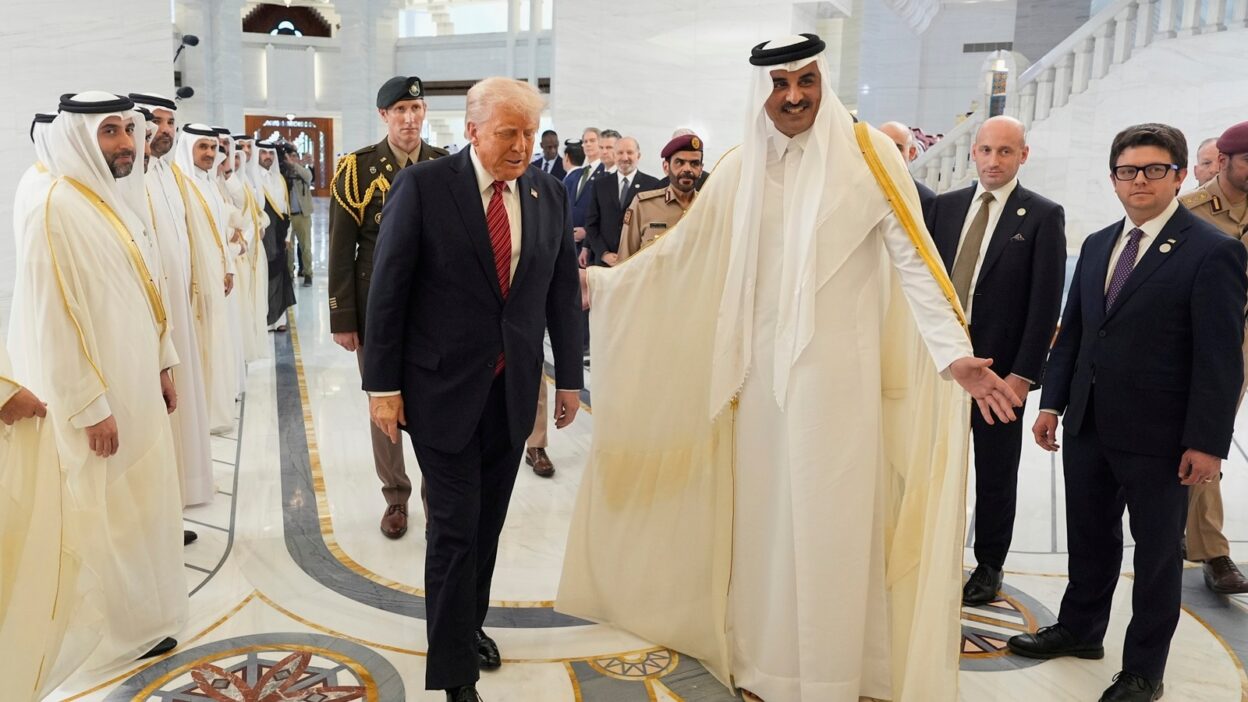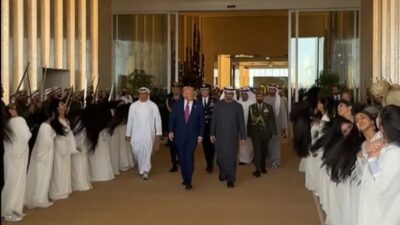President Donald Trump’s May 2025 West Asia tour, the first overseas trip of his second term and coincidentally a replay of his first trip to Riyadh as a first-term president in May 2017, is a calculated blend of economic ambition, strategic recalibration, and personal interest. Focusing on Saudi Arabia, the United Arab Emirates (UAE) and Qatar, the visit underscores shifting US priorities in the region. It has notable implications for American foreign policy, regional dynamics, and US-Israel and US-India relations.
Trump’s itinerary is prioritising economic partnerships over traditional diplomatic policies towards the region. In Riyadh, Trump secured a $600 billion Saudi investment pledge in US infrastructure and technology sectors, surpassing the $450 billion figure touted during his first term. The UAE is also committing to $1.4 trillion in investments over the next decade, focusing specifically on artificial intelligence, defence and energy collaborations. These deals align with the Gulf states’ ambitions to diversify their economies and reduce oil dependence.
However, Trump’s first West Asian tour has skipped Israel, a departure from previous US administrations’ practices. This omission seems to signal a potential shift in the US’s regional engagement, emphasising economic ties with Gulf nations over traditional alliances. There have been visible tensions between President Trump and Israeli Prime Minister Benjamin Netanyahu, particularly over Israel’s ongoing military actions in Gaza. The Trump administration has recently shown frustration with the prolonged conflict, urging for a resolution and expressing dissatisfaction with Netanyahu’s approach. This shift could also be due to a change in American public opinion regarding Israel, with increased scrutiny over Israel’s actions in Gaza and its treatment of Palestinians.
In another significant policy departure, President Trump met with Syria’s new leader, Ahmed al-Sharaa, and announced the lifting of all US sanctions on Syria. During this meeting, Trump urged Syria to join the Abraham Accords, which were an imitative promoted by Trump during his first term that aimed to normalise relations between Arab states and Israel. While this could potentially benefit Israel by expanding its diplomatic ties, the unilateral nature of the decision and the lack of direct Israeli involvement have raised concerns in Tel Aviv.
Ethical Concerns – Trump the President, Trump the businessman
The tour is also highlighting the controversial intertwining of Trump’s presidential duties with his family’s business ventures. Concurrent with the official visits, The Trump Organization is also promoting real estate projects in the region, including an 80-story Trump Tower in Dubai and a golf resort in Qatar. Additionally, the family’s cryptocurrency firm, World Liberty Financial, has announced partnerships with state-backed investors in Abu Dhabi.
These developments have raised ethical questions about potential conflicts of interest, as Trump’s policy decisions may inadvertently benefit his family’s business interests. Critics argue that such entanglements could influence US foreign policy, blurring the lines between national interests and personal gain. President Trump’s acceptance of a $400 million luxury Boeing 747-8 jet as a present from Qatar has also ignited bipartisan criticism over potential legal, ethical, and national security concerns. Critics argue that the gift may violate constitutional emoluments clauses and raise espionage risks, while Trump has defended it as a cost-saving measure for taxpayers.
Impact on US-India Relations
While Trump’s trip is primarily aimed at bolstering economic ties between the US and Gulf nations, it also has indirect implications for the strategic and economic dynamics between Washington and New Delhi. Trump’s focus on securing substantial investment deals with Gulf states underscores a US intent to deepen economic engagements in the Middle East, notably in the context of infrastructure projects. The 2020 Abraham Accords under Trump 1.0 created opportunities for New Delhi to redefine and expand its ties with Gulf states by engaging in new minilateral frameworks like the I2U2 with Israel and partner Arab states. A renewed emphasis from the US on cooperation with Gulf nations in areas like defence, technology, and connectivity infrastructure may open avenues for trilateral collaborations involving India, including on IMEC which was mentioned as an area of India-US collaboration during Prime Minister Modi’s visit to Washington earlier this year.
However, During his Gulf visit, President Trump also again claimed credit for de-escalating recent India-Pakistan tensions through trade tactics. This assertion has caused discomfort in New Delhi, which has historically viewed the Kashmir conflict as a bilateral issue and has been wary of external mediation. Given the Saudi attempts to also mediate between India and Pakistan, India will need to carefully balance these developments to further develop economic partnerships without compromising its longstanding policies.
President Trump’s 2025 West Asia tour marks a significant shift in US foreign policy, emphasising economic partnerships and personal business interests over traditional diplomatic engagements. The more transactional approach to the Middle East favoured by the Trump administration signals a potential realignment of US alliances in the region, with ongoing negotiations with Syria and Iran. The long-term implications of this approach remain to be seen, particularly concerning US-India relations and the broader geopolitical landscape of West Asia.
The writer is Associate Professor of International Relations at the Institute of Political Science, Leiden University




